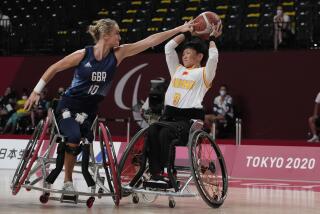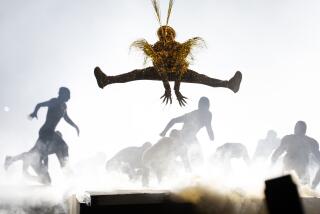The Seoul Games / Day 2 : THE OPENING CEREMONY : Plenty of Sunshine, Even More Security
- Share via
SEOUL — South Korea’s longed-for moment on the world stage arrived Saturday with the start of the Olympics, a 16-day global festival featuring the largest number of competitors in the event’s 96-year history.
“After seven years of preparation, difficulties and hope,” IOC President Juan Antonio Samaranch said during the opening ceremony, “we are finally gathered in this wonderful Olympic Stadium to celebrate together the solemn opening of this great festival of friendship--the Olympic Games.
“May these Games be held in the true spirit of sport and Olympism that is fraternity, friendship and fair play.”
To ensure that friendship and fraternity were present Saturday, the Olympic stadium was ringed by security forces, and the area around the arena was sealed off to anyone without a ticket to the opening ceremony. Those entering the 70,000-seat stadium walked through metal detectors, were subjected to a brief hand search and had their bags searched.
The intense security paid off. The ceremony went off without disruption and, as a bonus, in perfect weather. Twenty-four hours earlier, rain had been cascading down on Olympic Stadium.
The start of the Games of the 24th Olympiad ended seven years and $3-billion worth of preparation by a prideful people anxious to please the world. Residents of South Korea made up just a small part of the estimated 1 billion people who watched the opening of the Games on worldwide television.
To the natives of South Korea, however, the colorful and moving ceremony meant the most.
“The Land of the Morning Calm is about to become the arena for the dreams and ideals of young men and women from around the world,” said Park Seh Jik, president of the Seoul organizing committee.
“They are here to demonstrate the strengths and skills they have gained through years of dedication to their goals.
“As we head toward the 21st Century, these Olympics will be remembered as a milestone for the people of Korea and for all the peace-loving people of the world who cherish the noble spirit of the Olympics.”
Competition was set to begin less than two hours after completion of the ceremonies.
Women’s platform diving preliminaries were the first event on the schedule and Maria Alcala, 16, of Mexico City had the honor of being the first person to compete in the Seoul Olympics.
A blind draw gave her the leadoff spot in the platform prelims and her first dive was scheduled for 3 p.m. (1 a.m. EDT). Moments later, the first Olympic action in eight years by an athlete from the Soviet Union was to be produced by 1985 European diving champion Anjela Stasivlevich.
The Soviets boycotted the 1984 Olympics in Los Angeles, but will be one of 160 nations represented here. One of those countries--Brunei--sent a delegation of officials to the Games, but no athletes.
The ceremony was designed as a lesson in Korean culture in addition to providing an explosion of modern entertainment. And they succeeded.
There were such varied tableaus as the playing of ancient “dragon drum,” and the arrival of 76 skydivers parachuting into the stadium.
Mixed into the scenes representing old and new South Korea, however, were the traditional moments that make each Olympic opening special--the march of the almost 10,000 athletes, the raising of the Olympic flag and the lighting of the torch that will burn over the stadium during the course of the Games.
The entry into the stadium by the competitors is always the focal point of any opening ceremony and those athletes did not disappoint Saturday.
There were the white robes of those from Ghana, the deep blue jackets of the contingent from Britain and the orange, ankle-length great coats worn by the Australians.
The United States delegation, numbering almost 700 and the largest in the entry parade, entered the stadium in loose ranks and soon spilled out over the track. At the front of the group, carrying the American flag, was 1984 Olympic 100-meter dash gold medal winner Evelyn Ashford.
The Soviet Union contingent, in sharp contrast to the Americans, marched formally around the arena -- the women in bright red blazers and white skirts with the men dressed all in snow white suits and red ties.
The Olympic flame, lighted a month ago at the Temple of Hera in Olympia, was borne into the stadium by Sohn Kee-Chung, South Korea’s most famous athlete. He won the marathon gold medal at the Berlin Olympics in 1936, although he then was forced to compete under the Japanese flag bearing a Japanese name since Korea was ruled by Japan.
As the ceremony reached their conclusion, attention turned to the competition. In addition to the preliminary rounds in women’s diving Saturday night, there was action scheduled Saturday in boxing, basketball, soccer and volleyball. Full-scale competition will begin Sunday with five gold medals from the total of 237 being awarded that day.
None of the boxing matches Saturday night featured Americans, but the U.S. boxing team stayed busy with the latest in a series of controversies that have plagued their.
More to Read
Go beyond the scoreboard
Get the latest on L.A.'s teams in the daily Sports Report newsletter.
You may occasionally receive promotional content from the Los Angeles Times.






